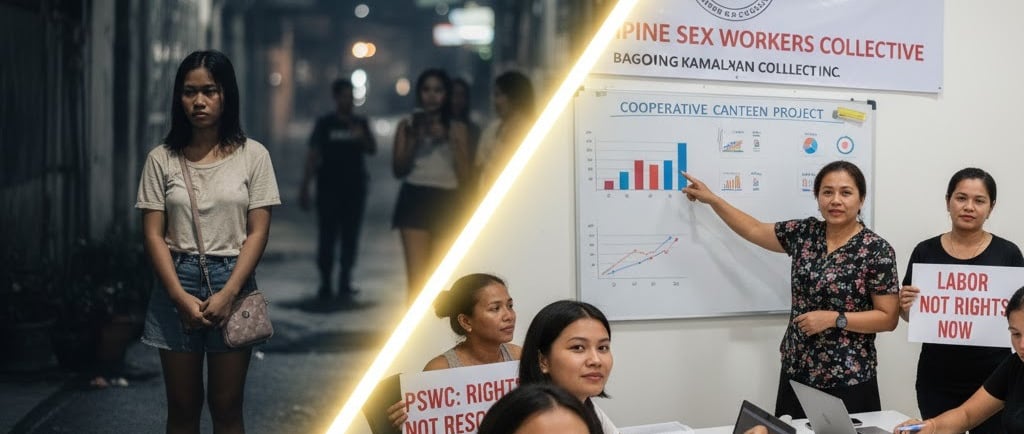The Resilient Filipina Sex Workers Who Are Forging Their Own Success
THE EDITORIAL CHEESE
Patrick Petinglay Villavert
11/10/20253 min read


The narrative of the Filipina sex worker is too often confined to one of simple victimhood, stripping away the agency, resilience, and success that many women demonstrate in this precarious industry. While it is undeniable that poverty and lack of opportunity drive many into sex work, a shift in perspective—championed by the workers themselves—reveals not just struggle, but survival, entrepreneurship, and powerful political advocacy.
The very existence of successful, outspoken Filipina sex workers and their organizations is the strongest argument for legalization: their success is achieved despite criminalization, imagine what they could achieve with legal protection.
Success in Advocacy: The Power of Collective Action
The most significant success story of Filipina sex workers is their ability to organize and mobilize against overwhelming social and political odds. Their fight is not just for survival, but for the fundamental recognition of their work and their rights.
The Philippine Sex Workers Collective (PSWC): An umbrella group that grew out of the pioneering Women Hookers Organizing for their Rights and Empowerment (WHORE), established in 1989. Despite the risk of criminal prosecution, the PSWC operates to reject the dominant "victim narrative" and demand that sex work be recognized as work.
The Achievement: Their biggest success is sustained political critique and consciousness-raising in a deeply conservative, predominantly Catholic country. They challenge government anti-trafficking efforts that conflate all sex work with violence, arguing that rescue operations often inflict further trauma by interrupting their livelihood and stripping them of their agency and earnings.
The Challenge: Due to the criminal status of their work, the Collective cannot legally register as an organization. This barrier limits their access to formal funding and prevents their members from officially unionizing—a clear example of how prohibition actively sabotages their collective empowerment.
Speaking Truth to Power: Sex worker advocates, often operating anonymously or using pseudonyms, consistently engage with researchers and policy-makers to highlight the direct harms of prohibition: police harassment, violence from clients, and the inability to report crimes without fear of arrest. Their collective voice has become an essential, albeit constrained, counter-narrative to the prevailing government discourse.
Success in Transition: From Sex Work to Sustainable Enterprise
For many Filipinas, sex work is an economic stop-gap, a means of generating capital or supporting a family until a viable alternative can be found. The success here lies in their ability to leverage their earnings, discipline, and networking skills to build legitimate, stable futures.
The Cooperative Model: Groups of former and current sex workers have successfully transitioned their collective strength into social enterprises. For example, some organizations, with the help of allied NGOs, have created and sustained livelihood projects:
Liza Gonzales and the Bagong Kamalayan Collective Inc. (BKCI): After leaving the trade, Gonzales and other "survivors of prostitution" formed BKCI to prove that a stable livelihood after sex work is possible. They pooled resources and skills from livelihood training seminars to open a cooperative canteen, demonstrating the entrepreneurial capacity and financial discipline often acquired in the sex trade. Their profits support their families and help send their children to college—a clear measure of success in breaking the cycle of poverty.
The Entrepreneurial Mindset: Sex workers often possess a powerful entrepreneurial skillset: astute risk assessment, client management, strong negotiation abilities, financial literacy (managing fluctuating incomes), and resilience under pressure. When the legal stigma is removed, these very skills are easily transferable to legitimate businesses.
The True Measure of Success
The "success" of a Filipina sex worker should not be measured by how quickly she exits the industry and conforms to a non-sex-work life, but by her autonomy, safety, and economic stability. Legalization and full decriminalization, as seen in models like New Zealand, would transform their successes from acts of individual defiance into rights guaranteed by the state:
Safety as a Right: Sex workers would gain the legal power to screen clients, refuse services, report violence without fear of arrest, and hire security personnel—reducing their risk of harm.
Economic Recognition: They could pay taxes, receive social benefits, and operate openly, allowing for business growth and a clear path to building wealth and professional stability.
Political Voice: Their advocacy groups could register, receive funding, and directly participate in legislative consultation, turning "strategic invisibility" into full, democratic participation.
The stories of resilient Filipinas—those fighting for rights within the trade and those who have successfully leveraged it to exit poverty—serve as a powerful, living rebuke to the current prohibitionist policy. The Philippine government has a choice: continue to punish and endanger these resilient women, or empower their success by recognizing their humanity and their labor.
